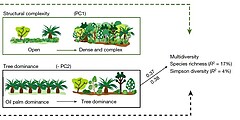Detail view
New article in “Nature”: Biodiversity even in oil palm plantations [24.05.23]
Islands of trees in oil palm plantations increase biodiversity without decreasing yields. This has been shown by longitudinal experiments carried out by the University of Göttingen and evaluated by the University of Hohenheim
(pug) Islands of trees in oil palm plantations can significantly increase farm biodiversity within five years without reducing productivity. This has been shown by a long-term project in Indonesia as part of the collaborative research center "EFForTS" at the University of Göttingen, a project in which the University of Hohenheim and the German Center for Integrative Biodiversity Research (iDiv) Halle-Jena-Leipzig were also involved. The scientists created experimental areas of trees on the island of Sumatra to counteract the species depletion caused by the intensive cultivation of oil palms. The results appeared in the current issue of the journal Nature: doi.org/10.1038/s41586-023-06086-5
Converting tropical forests to oil palm plantations results in significant losses of biodiversity and ecological functions. A total of around 21 million hectares of oil palm plantations are cultivated worldwide, mainly in Indonesia and Malaysia.
To mitigate the negative environmental impacts, the scientists planted 52 islands of trees using six local tree species in an industrial oil palm plantation – which turned out to be a promising ecological restoration strategy.
Globally unique approach on an industrial scale without yield loss
The research team had expected yields to deteriorate over time as the tree islands consumed resources for their own development at the expense of the oil palms. “However, this was not the case even five years after the start of the experiment, and without the use of artificial fertilizers in the tree islands,” stated lead author Prof. Dr. Delphine Clara Zemp, now at the University of Neuchâtel. “Our results show that the industry can benefit from this measure. There is real potential to develop these ecological restoration practices on a large scale.”
“Most ecological studies on palm oil are limited to recording biodiversity loss and ecosystem degradation,” stated co-author Prof. Dr. Holger Kreft, head of the Biodiversity, Macroecology and Biogeography research group at the University of Göttingen. “Our approach to ecological restoration goes a step further and is unique in the world because it takes place against a backdrop of industrial-scale oil palm plantations over large areas. Using a rigorous experimental design, we can determine the optimal composition and size of islands that will produce the best possible ecological restoration.”
“Guidelines for certification can also be developed on the basis of the work, for example,” said Prof. Dr. Ingo Grass, head of the Department of Ecology of Tropical Agricultural Systems at the University of Hohenheim. “This would give consumers a choice here in Europe as well and allow them to use their market power to make palm oil cultivation more sustainable.”
Studies include biodiversity, water, and carbon and nutrient cycling
Over several years, the scientists analyzed the biodiversity of soil microorganisms (bacteria, fungi), insects and other small invertebrates, plants, birds, and bats. They also quantified impacts in terms of water, carbon, and nutrient cycle regulation, microclimate, soil quality, pollination, and control of biological communities and alien invasive species.
Close cooperation with the plantation operators was also essential for the research project to run smoothly. “Collaborating with them also helped us to better consider the agronomic aspects of the plantation and how our experimental trials affect oil palm yields. This aspect is crucial for the industry,” said Zemp.
However, according to the 40 authors of the study, the top priority must continue to be the prevention of deforestation: “The encouraging results must not be allowed to jeopardize the conservation of tropical forests, which harbor irreplaceable biodiversity,” the team concluded.
BACKGROUND Collaborative Research Centre EFForTS and scientific team
The Collaborative Research Centre "Ecological and Socio-economic Functions of Tropical Lowland Rainforest Transformation Systems (EFForTS)" is funded by the German Research Foundation (DFG). Further information can be found here: www.uni-goettingen.de/efforts. Contributions to this paper are from researchers around the world including those at the Institut Pertanian Bogor and Jambi University in Indonesia, the universities of Neuchâtel in Switzerland, Hohenheim in Germany, and the German Centre for Integrative Biodiversity Research (iDiv) Halle-Jena-Leipzig.
Original publication
Delphine Clara Zemp et al. Tree islands enhance biodiversity and functioning in oil palm landscapes. Nature 2023. https://doi.org/10.1038/s41586-023-06086-5.
Text: pug/klebs
Contact for press:
Prof. Dr. Ingo Graß, University of Hohenheim, Department of Ecology of Tropical Agricultural Systems, +49 711 459-22385, ingo.grass@uni-hohenheim.de
Assistant Professor Delphine Clara Zemp, University of Neuchâtel, head of the Conservation Biology Lab, T +41 32 718 31 14, E clara.zemp@unine.ch
Prof. Dr. Holger Kreft, University of Goettingen, Head of the Department Biodiversity, Macroecology & Biogeography, T +49 551 39-28757, E hkreft@uni-goettingen.de
Back to

